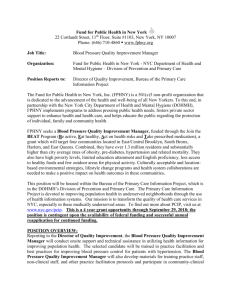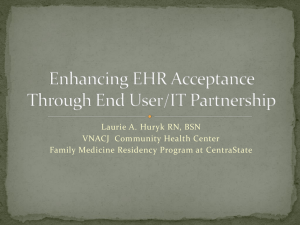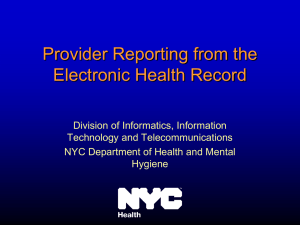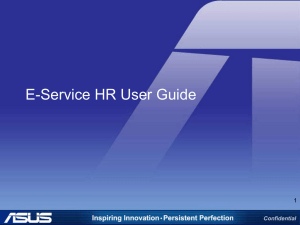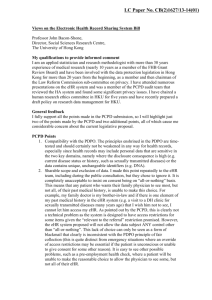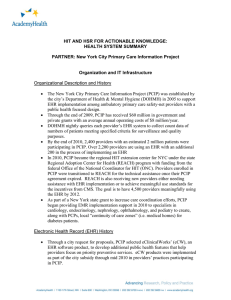Case Study: New York City Background
advertisement
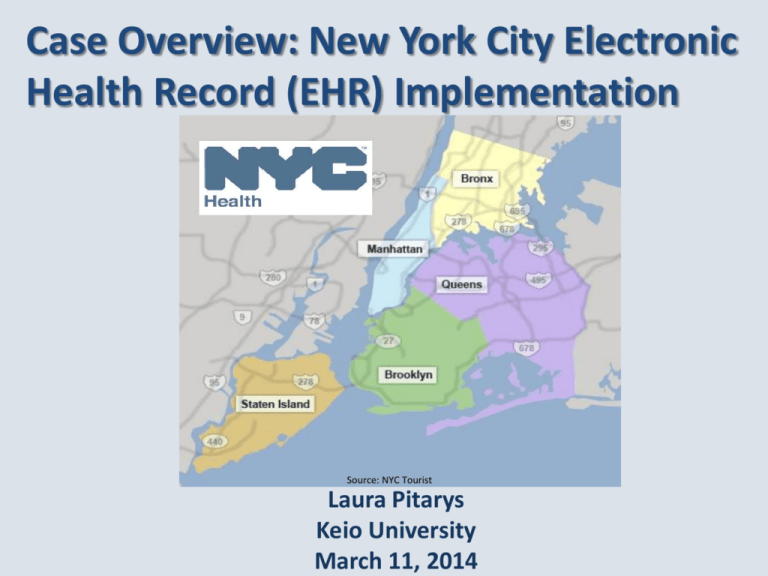
Case Overview: New York City Electronic Health Record (EHR) Implementation Source: NYC Tourist Laura Pitarys Keio University March 11, 2014 Main Points The New York City EHR program’s success: 1. Targeted approach 2. Strong government support in implementation and funding 3. Public Health objectives 4. Transparency in results 5. Innovative pilots Agenda NYC Health Policy Overview Primary Care Information Project (PCIP) Overview PCIP Mission and Objectives Addressing Privacy and Security Issues PCIP Funding and Financing Evaluations, Results and Challenges Looking Forward/Next Steps Hurricane Sandy: October 29, 2012 Source: New York Daily News $50B damage in the US 117 lives lost Sources: CDC and NHC Source: NYC DOHMH New York City Health Policy Environment Health Snapshot Population • Roughly 8.3M residents in 2012 Poverty • 21.2% of New York City residents fall under the poverty line in 2012. Sources: NYC Department of City Planning,, NY Times, United Hospital Fund and NYC DOHMH. Health Snapshot Medical Access • Approximately 1.2M uninsured in NYC in 2009 Health • 650,000 NYers have diabetes and another 1M are pre-diabetic. • 15.5% of adults smoke. Sources: NYC Department of City Planning,, NY Times, United Hospital Fund and NYC DOHMH. Medically Underserved Areas in NYC Sources: US Dept. of Health and Human Services and New York World NYC Primary Care Information Project Overview Terms NYC DOHMH PCIP • New York City Department of Health and Mental Hygiene • Municipal public health agency funded by tax payers • Primary Care Information Project • EHR program managed by DOHMH Terms eClinical- • EHR software vendor selected by DOHMH Works RHIO • Regional Healthcare Information Organization • Collaborative groups of providers working on EHR interoperability. Terms, cont. Medicare • Health insurance for elderly Americans Medicaid • Health insurance for low income Americans Terms, cont. EHR PHR • System that has the ability to connect/interact with other systems (e.g. EMR, pharmacy, lab, other EHR, etc.) • Interface that allows patients to view their own medical data and add/modify some data. Background Sponsor NYC Department of Health Project Primary Care Information Project Policy Advocates Mayor Bloomberg and Commissioner Frieden Timeline 2005-present Program Objective Addresses Public Health Concerns Criteria: The Key to PCIP is Point of Care & Preventive Care Diagnosis Outpatient Inpatient Criteria: Those most in need of medical care Requirement: Primary Care providers (outpatient) Serving low income neighborhoods, or Minimum 10% Medicaid (or uninsured patients), and Correctional Health facilities (e.g. Rikers Island jails) Public Policy Objectives PCIP was intended to help improve preventative care, particularly those at risk for chronic diseases. Areas of health policy concern in NYC include: obesity, Type II diabetes, cardiovascular health, high blood pressure and smoking cessation. Public Policy Objectives The PCIP metrics were aligned with the public health Take Care New York (TCNY) core areas (strategic health policy priorities). TCNY PCIP • Quality health care for all • Be tobacco free • Be heart healthy • Healthy neighborhoods • Exercise & healthy eating • Stop the spread of HIV & STIs • Recognize & treat depression • Reduce alcohol & drug use • Prevent & detect cancer • Raise healthy children EHR Implementation NYC Dept. of Health (DOHMH) chose one EHR vendor for implementation. eClinicalworks, the selected vendor, had a successful track record when Massachusetts providers were given an option in the Mass. EHR initiative. EHR Implementation Small Practice EHR Vendors Source: IDC Health IT Strategy 2012 Evolution of EHRs Hospitals, Clinics, other care facilities (connected through RHIOs) Specialists (including behavioral health) Primary Care Providers for Medically Underserved (including Correctional Health facilities) NYC PCIP Mission and Objectives PCIP Mission Patient Centered Approach Patients are able to see lab results, prescriptions and make appointments and communicate with doctor online. Clinical Quality Improvement Ability to aggregate data to evaluate the quality of preventive care as well communicable disease outbreaks. Clinical Decision Support System reads patient data and gives providers suggested interactions or potential at-risk for chronic disease. 24 EHR Capabilities Provider PCIP Patient (PHR) Pharmacy Labs EHR Capabilities Primary Provider Hospitals / Specialists PCIP Patient (PHR) Pharmacy Labs EHR Capabilities EMR Claim PHR EHR PM Labs Rx Patient Centered Approach Patient Centered Approach Patients are able to see lab results, prescriptions and make appointments and communicate with doctor online. Patients are encouraged to educate themselves about their health and actively manage any conditions. Email communication with doctors is enabled as are scheduling capabilities and prescription refill requests. 28 Patient Portal Account Information Intake Forms Messages Appointments Reminders Requests Medical Records Education Materials 29 Patient Portal Snapshot 30 Patient Portal Snapshot 31 Patient Portal Snapshot 32 Clinical Quality Improvement Clinical Quality Improvement Ability to aggregate data by clinic/hospital to evaluate the quality of preventive care as well communicable disease outbreaks. Pay-for-performance (P4P) based on effective utilization of the system Medicine recall alerts: Alerts sent from the Department of Health to providers through EHR system. 33 Clinical Quality Improvement Comparative dashboard reports available to clinicians by PCIP. No identifiable patient data is transmitted to the Dept. of Health! 34 Dashboard Source: DOHMH 35 Dashboard Details Source: DOHMH 36 Clinical Decision Support System (CDSS) Clinical Decision Support System reads patient medical history and data and gives medical providers suggested interactions or potential at-risk for chronic disease. Based on clinical and demographic information entered (e.g. patient with chronic disease), the system requires prompts for additional questions/information. The system stores the answers to prompted questions, lab results, prescription information and vital signs. Alerts for missing data. 37 Clinical Decision Support An example of the parameters for Type II diabetics is: At least 18 years of age and Body Mass Index of > 25, > 22 if Asian and Pre-diabetes diagnosis (i.e., fasting plasma glucose: 100-125 mg/dL, oral glucose tolerance test: 140-199mg/dL, or A1C: 5.7-6.4%) Source: NYC Department of Health and Mental Hygiene EHR Results & Effectiveness Source: NYC Department of Health and Mental Hygiene EHR Results & Effectiveness Source: NYC Department of Health and Mental Hygiene NYC PCIP: Issues of Privacy and Security Privacy Issues HIPAA • Health Insurance Portability and Accountability Act of 1996 (Federal Law) • Sets national standards for patient security/privacy HITECH • Health Information Technology for Economic and Clinical Health Act (2009) • Funding for EHR adoption and breach laws Privacy Issues Security Privacy Admin. Simplific ation HIPAA / HITECH New York State Public Health Law also has its own provisions on patient privacy. Privacy Law Impacts on EHR Examples of EHR privacy/security setting from PCIP. Session TimeOut Authentication Lock-Out Alpha-Numeric Passwords Minimum Length Passwords Password Change Requirements and Alerts SSN not used as unique identifiers Source: New York City DOHMH. Privacy Law Impacts on EHR, Cont. Examples of EHR privacy/security setting from PCIP. Patient ability Audit Trails Role-based access Data security policies Hardware security Source: New York City DOHMH. to opt-in/out of HIE Antivirus software Privacy Enforcement Education and training on HIPAA & HITECH rules, appropriate EHR uses. Prevention Maximum calendar year penalty is $1.5M Annual Max Fines Monetary Fines of $100 $50,000 per violation Data breaches of 500+ must be reported to media outlets and affected patients. 46 Electronic Consent Forms In New York, a patient must opt-in and actively consent to care. Source: Housing Works. NYC PCIP: Funding and Financing Subsidies: How much and from whom? The original funding for PCIP was City Tax Levy ($30M). Funding Source City Tax Levy Purpose Start-Up; implementation; software and hardware State Federal Interoperability and EHR extension Private Medicaid / Medicare Other P4P; evaluations; extension pilots “Stimulus” funds for interoperability & EHR usage Incentives and penalties for meaningful use of EHR Funds that did not make is into the City coffers, but that are used to support regional EHR implementation (e.g. State funds, RHIOs, etc.) Who pays for what? Item Initial Hardware Initial Software PCIP √ √ Implementation Support, Training On-going Software fees √ On-going maintenance Internet connections Replacement hardware Provider √ √ √ √ Patients pay nothing for the system or access to the patient portal Providers pay a $4,000 contribution to offset the costs of implementation and training. NYC PCIP: Results, Challenges and Achievements EHR Results & Effectiveness 54 Over 4 Million Patients Clinics 63 Community Health Centers Over 9,000 providers 31 Large Practices 1,064 Small Practices Note: 3,200 providers and 3+ million patients through initial PCIP program. Extension programs have reached additional providers. EHR Results & Effectiveness Blood Pressure 96,000+ patients reduced their high blood pressure Diabetes Management 81,000 patients improved their diabetes management. Smoking 58,000 smokers were given assistance and successfully quit. Source: NYC Department of Health and Mental Hygiene NYC EHR: Moving Forward EHR Interoperability CCR (XML format): Header Patient Identifying Information Patient Financial and Insurance Information Health Status of the Patient Claims Care Documentation Care Plan Recommendation EMR EHR Patient Matching done by: Name DOB PHRGender RHIOs have internal unique identifiers within their systems PM Labs Pharmacy EMR EMR Claims PHR Claims EHR PM Labs Interoperable Technology (RHIOs/CCR) PHR EHR PM Labs Pharmacy Pharmacy EHR Next Steps Macroscope Pilot: Using aggregate EHR data to track chronic diseases in real time and allow policy makers to react more quickly to changes trends. PEEK (Patient Education and Engagement Kiosk) Pilot: Tablets in waiting rooms for patients to access PHRs and educational information. Follow-up calls to patients who have certain conditions and have not seen a doctor in the recommended timeframe Success Factors and Challenges Success Pay For Performance Incentives Implementation support and training Funding to offset risk Commitment from government Transparent Results Success Factors and Challenges Challenges Interoperability Expanding network Maintaining Data Integrity Sample Data and Population Photo: Harvard Magazine “ . . . Ensuring every New Yorker, regardless of income, has access to best healthcare possible. We really can make a difference if we work together.” - Mayor Michael Bloomberg, 2013 Thank you
